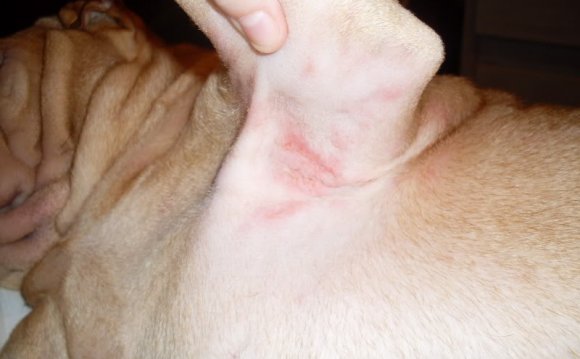
 Shar-peis require a lot of shampooing.
Shar-peis require a lot of shampooing.
Think of a shar-pei and the first thing that probably comes to mind is "wrinkles." His most distinctive feature, wrinkles can also mean problems for the breed. Proper skin care helps prevent some of the skin conditions affecting shar-peis. Find a vet familiar with the breed to guide you.
Basic Skin Care
By the nature of their skin and various hereditary problems, shar-peis are high-maintenance dogs. Taking care of your dog's skin and coat will take up a considerable amount of your time, or money if you frequently use the services of a groomer. To prevent skin disease, bathe your dog at least once a week, and brush him daily. While brushing, carefully inspect the skin between the wrinkles. That's where the problems usually start.
Fleas
Shar-peis are subject to flea allergy dermatitis, so make sure your dog's flea control is always up-to-date. If you have other dogs or cats in the household, these animals must also stay on a strong flea protocol to avoid spreading pests to the shar-pei. Depending on your climate, your dog may have to receive flea medication year-round. Ask your vet about the most effective flea control for your area.
Feeding
Part of skin care for the shar-pei includes feeding your dog the right diet. Prone to food allergies, the reaction to such allergies shows up on the dog's skin in the form of scratching, hair loss and lesions. Shar-peis often react to protein in the food. Ask your vet about the best food for your dog in order to avoid food allergy reactions. Your vet may conduct allergy tests to determine exactly what your shar-pei reacts to in his diet.
Infections
Bacteria and yeast love dark, moist places, so they flourish in the skin between the wrinkles. If your dog starts emitting a foul odor from his skin, suspect an infection. Avoid this problem with a daily "wrinkle-clean." If your dog's skin is infected, the vet will likely prescribe oral and topical antibiotics to clear up the problem.
Allergies
In addition to flea and food allergies, shar-peis are allergic to - well, you name it, they're probably allergic to it, and it manifests as skin problems. This includes the common dust mite, pollen, mold, grass and other environmental triggers. Your vet conducts allergy testing to determine what items bother your dog. Desensitization shots may offer relief. You may want to invest in a home air filter to keep allergens at bay.
dizayn-i-interer https://wm-tema.ru/
YOU MIGHT ALSO LIKE












